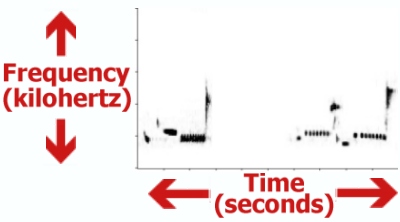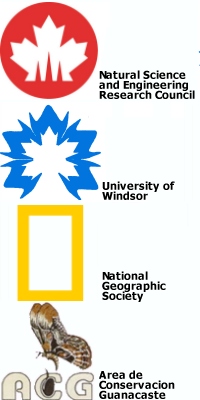     |
 |
|
For
More Information On Santa Rosa... There are many excellent books on
the natural history of Costa
Rica. Here are four that are especially important: 1.)
A Guide to the Birds of Costa Rica by
Frank Stiles and Alexander Skutch is a critical book for anyone
traveling to Costa Rica. The fantastic bird illustrations in this book
by Dana
Gardner are featured on the "Bird Songs" page of this website. 2.)
Neotropical Rainforest Mammals by
Louise Emmons and Francois Feer is necessary reading for anyone
traveling to Costa Rica. The excellent mammal illustrations in this
book by Francois
Feer are featured on the "Other Animal Sounds" page of this website. 3.)
Costa Rican Natural History by Daniel
Janzen provides detailed accounts of many aspects of the flora
and fauna of Costa Rica as well as countless excellent photographs.
Many great scientists collaborated on
writing species accounts of Costa Rican plants, reptiles, amphibians,
mammals,
and birds for this book. 4.)
Green Phoenix: Restoring the Tropical
Forests of Guanacaste, Costa Rica by William Allen is a popular
account of the history of Santa Rosa National Park. This book is an
exciting read for anyone visiting the Guanacaste Conservation Area.
It is also a very compelling book for anyone
interested in the challenges of tropical forest conservation. Web links Pages about Santa Rosa and Costa Rica:Guanacaste Conservation Area / Area de Conservación Guanacaste Website - Find out about the Guanacaste Conservation Area, including Santa Rosa National Park. The ACG homepage includes all sorts of information including photographs, maps, a "virtual tropical dry forest", and much more. Protect the Rincon Rainforest Page - Find out how you can contribute to protecting the tropical forests of Northwest Costa Rica. Your help is badly needed in the effort to conserve the tropical forest which is home of the animals featured on this webpage. The Janzen & Hallwachs Caterpillar Homepage - An amazing online resource featuring a searchable database of photographs and descriptions of the moths and butterflies of the Guanacaste Conservation Area. Pages about bird songs: Mangoverde - This website, maintained by William Hull, is an amazing online resource featuring a searchable database of bird song recordings from all over the world. NatureSongs - This website, maintained by Doug Von Gausig, features bird song recordings from many different places, and includes an extensive collection of recordings of sounds from birds, mammals, herps, and insects from all over Costa Rica. Parrots of Santa Rosa - Read detailed accounts of the common parrots of Santa Rosa National Park, view photos, and hear sound clips. Cornell Lab of Ornithology - Visit the excellent website of one of the finest centers of ornithological research in the world. Be sure to visit the Macaulay Library of Natural Sounds Page (the largest collection of animal sound recordings in the world) and the Bioaocustics Research Program Page. Other pages: Dan Mennill's Homepage - Visit my homepage to find out more about the research my students and I conduct on the behavioural ecology of temperate and tropical birds. Stephanie Doucet's Homepage - Visit Stephanie's homepage to find out more about her research on the evolution of sexual ornaments in temperate and tropical birds. Dana Gardner's Gallery of Bird Art - The pictures of birds on this website are all copyright Dana Gardner and appear in his excellent plates within Stiles & Skutch's Guide to the Birds of Costa Rica. About the recordings All of the bird songs presented on this website were recorded by Dan Mennill. Most recordings were made with a Sennheiser MKH-70 or ME-66 shotgun microphone and a Marantz PDM670 solid state digital recorder. Some recordings were made with a specially-designed eight-microphone system that my research group uses to record neighbourhoods of songbirds. Recordings were edited with John Burt's Syrinx-PC sound analysis software. Recordings were edited subtly in order to remove long pauses and to emphasize the sounds of interest. Songs were saved as MP3 files using Apple's iTunes software at 128 kbps setting. MP3 files are an efficient way to store sound in small files, but they lose information contained in the original recordings. Although MP3 files sound normal to us, they might sound unusual to birds.
 About sound
spectrograms About sound
spectrogramsAll the sounds on this webpage
are presented alongside a sound
spectrogram. Sound spectrograms are graphical representations of
sound. They are analogous to a piece of music, where time is shown
along
the horizontal axis and frequency (or pitch) is shown along the
vertical axis. For all of the spectrograms on this webpage, each tick
mark on the horizontal axis represents one second and each tick mark on
the vertical axis represents one kilohert.
|
|
The
drawings of birds on this
website are by Dana Gardner
from the
excellent book A Guide
To The Birds Of Costa Rica
by Gary Stiles and Alexander Skutch, which is a required book for
anyone
traveling to Costa Rica. You can see more of Dana's bird art at his
website: A Gallery of
Bird Art by Dana Gardner. The drawings of mammals on this webpage
are by Francois Feer from the
excellent book Neotropical
Rainforest Mammals by
Louise Emmons and Francois Feer, an important book for anyone
traveling to Costa Rica. All of
the photos on this website were taken
by Daniel Mennill and Stephanie Doucet; please do not use them without
requesting permission (dmennill AT uwindsor DOT ca).
|
|
All
recordings, graphics
and information on this website are copyright Dan Mennill, 2005, unless
otherwise indicated. All information is intended for educational
purposes
and personal enjoyment. Please request written permission from me by
email (dmennill
AT
uwindsor DOT ca) before
you use any recordings, graphics, photographs, or other information
from this webpage. I will happily grant permission for almost any
non-commercial purposes and I am willing to discuss terms for
commercial purposes.
 Acknowledgments Acknowledgments
For
supporting my ongoing research on bird song, I
am deeply thankful to the Natural Sciences and Engineering Research
Council of Canada
(NSERC), to the University of Windsor and the Department of Biological
Sciences at the University of Windsor, and to the National Geographic
Society. I am very
thankful to Roger Blanco and the staff at Santa Rosa National Park in
the Guanacaste Conservation Area for their logistical support. I thank Geoff Hill for the use of
his microphone equipment used in many of these recordings. All aspects of this project have benefited
from the advice and support of Stephanie Doucet.
|
    |
|
All information on this website is copyright Daniel Mennill 2005 unless otherwise indicated. No recordings, photographs, or other information may be used without written permission from me. Please email me at dmennill AT uwindsor DOT ca and I will happily grant permission for most non-commercial or educational purposes. |
 Credits
for pictures and photos
Credits
for pictures and photos